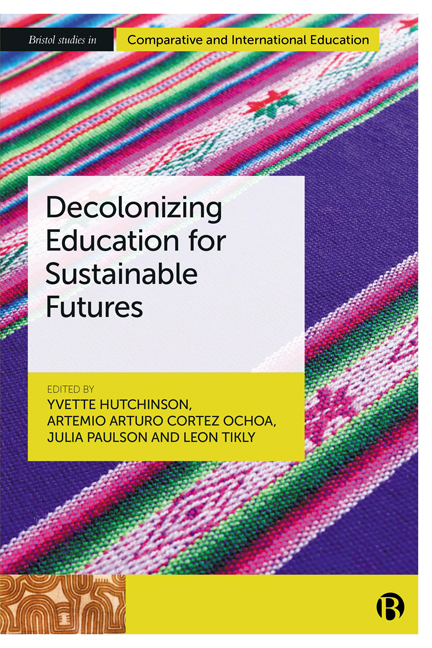Book contents
- Frontmatter
- Contents
- Series Editor Preface
- List of Figures and Table
- List of Abbreviations
- Notes on Contributors
- Acknowledgements
- Introduction
- PART I Connecting Decolonial and Sustainable Futures in Education
- PART II Decolonizing Education for Sustainable Futures: From Theory to Practice
- PART III Education’s Reparative Possibilities: Responsibilities and Reckonings for Sustainable Futures
- Conclusion
- Afterword
- Index
Afterword
Published online by Cambridge University Press: 18 January 2024
- Frontmatter
- Contents
- Series Editor Preface
- List of Figures and Table
- List of Abbreviations
- Notes on Contributors
- Acknowledgements
- Introduction
- PART I Connecting Decolonial and Sustainable Futures in Education
- PART II Decolonizing Education for Sustainable Futures: From Theory to Practice
- PART III Education’s Reparative Possibilities: Responsibilities and Reckonings for Sustainable Futures
- Conclusion
- Afterword
- Index
Summary
Introduction
This volume has undertaken an original and highly ambitious examination of the link between sustainable futures and decolonization of education: drawing upon original studies in many contexts to show how dismantling the practices and structures of oppression is essential to a sustainable future. Furthermore, chapters in Part II of the book specifically investigate issues of praxis: ways in which students, teachers and communities can collectively apply concepts and theories of social justice to transform educational institutions. Finally, Part III touches upon the theme of reparation, of how past injustices must be addressed in order to create a sustainable future.
A fitting extension of this inquiry, then, is to consider this work itself as a form of praxis and identify how it might promote a sustainable future, but also reproduce unsustainable practices of the past. This consideration is particularly relevant in relation to climate change, the warming of the Earth's atmosphere as a result of greenhouse gasses (mainly carbon dioxide from fossil fuels), and the destruction of ecosystems that have regulated the Earth's atmosphere in the past. Climate change is a clear threat to the sustainable futures of our planet. It is often described as an existential risk to human societies as we know them, leading many to suggest ‘climate emergency’ as a more appropriate term. It is also part of a larger systemic ecological crisis, comprising the loss of biodiversity that scientists are suggesting constitutes Earth's sixth mass-extinction event (Barnosky et al, 2011).
Climate change is also an issue of social justice: it creates inequalities in the rights of present and future individuals to live healthy and prosperous lives. These inequalities disproportionately affect marginalized groups within and across countries: racialized minorities, Indigenous communities and formerly colonized societies (Perry, 2020). Finally, climate change is also a problem with deep historical roots: it results not just from the unsustainable practices of today but the accumulated emissions of several centuries. These historical emissions were concomitant to the projects of colonization and oppression that characterize industrial society and global capitalism. Therefore, a truly reparative approach to decolonization also requires addressing the climate emergency.
- Type
- Chapter
- Information
- Decolonizing Education for Sustainable Futures , pp. 250 - 256Publisher: Bristol University PressPrint publication year: 2023



